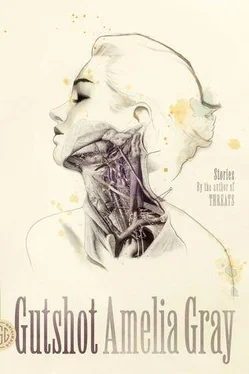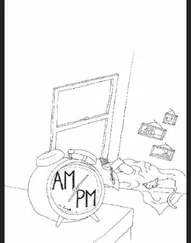They sat for a moment together. The other man placed his hand atop Jim’s. “Please, don’t give up,” he said to the woman.
“I’m not,” the woman said.
“Good,” Jim said.
“Good,” said the man.
They left her there, the other man a step behind. Outside, Jim looked to the cars lined up on the highway. “Let’s go,” he said. “We have places to be.”
“Let’s go,” said the man.
You know the rest.
It’s harder to leave your burning home after you’ve spent so much time cleaning its floors. Watching those baseboards char should be enough to make any good woman lie back in bed and let it happen. The fact that I got up and hauled Angela out with me is proof enough of my selfishness.
The years with her father before the fire — when I still had my figure and the energy to walk about, the will and ability to be moved — passed with such seeming ease, but the truth of those days and the trouble they held is lost in the archives of memory’s drunken catalog. Its delicate, age-soaked pages stay with me like an old phone book packed and moved out of some sentimental urge.
If anyone has found an adequate response to that fiction of chemical and circumstance which is love, it is my Angela. Even when she was a girl, she squirmed out of my grasp and kissed the kitchen table instead. She was barely toddling and would force me with pleads and screaming to spend hours on the bridge over the county road, tucking flowers between its wooden slats.
She shrank into a child’s malaise when they demolished the old post office. The workers had dumped the remnants of the structure and covered it with a few buckets of sand, and she wept and reached for it. This wasn’t her usual brand of sadness, the kind she had when her blanket was tumbling in the dryer and she could only watch from her crib, a few sweet tears on her cheek. At the pile, she was hysterical. I let her down and she stumbled toward it, tripping over her feet, grinding dirt into her hands and face, ruining her play clothes. She kicked and crawled, wailing, scrabbling at the pile until finally her fingers found purchase. She took hold and leaned back with her full weight, wrenching a brick free and inspiring a plume of dirt. A man walking down the road stopped and stared. She cleared the brick from the pile, covered it with her body, and was asleep by the time I approached. I couldn’t remove it without waking her and so brought it home with us, the thing weighing her down in her car seat. I remember it was warm, the brick. At home, I wrapped it in a sheet of newspaper and left it on the dresser beside her crib.
She took on a mighty insomnia, reaching always for the brick. A neighbor suggested the pediatric hospital downtown. I considered an appointment but couldn’t bear to think of them running tests on a little girl who had merely cried over a pile of building materials. She was too sensitive and thoughtful, easy to tears and infant rages. This could all mean strength and character in adulthood, but any doctor would return with her simple imbalances marked on a chart. He would never wonder if something is not simply born into a person with no reason or requirement. Her father would have agreed. And so I put the brick in her crib with her and she slept soundly. From my chair, in which I spent only the evening hours of those new days, I sipped my drink and strained my ears to the strange sound of her silence.
My darling girl fattened into a woman but never truly recovered from the malaise which distinguished her as a child. She took the room above mine when it opened up in the duplex and brought my dinner down every night. My sensibilities lean to the fish fry and hot dish. A dessert of mine once took first in the neighborhood fair after I took the boxed brownie mix and added chopped up Mars bars; all the ladies did it that way after that. I appreciate her, but truly she is dull in the kitchen.
My bacon was always crisp, my roast chicken a celebration of subtle spice. Meanwhile, she microwaves her meats to the consistency of a hot rubber wheel. She substitutes rice for butter because of its similar shade. She keeps her potatoes for hours in boiling water, creating a soup she must strain before she dishes up the slop.
She served me a plate of canned beans on a piece of white bread and told me it was a recipe she found on the television.
“What television are you watching?”
“We should go to the tower,” she said, settling into the couch beside me, moving my oxygen tank to make room for her feet. I fantasize about being rid of the couch; I never much cared for the lack of material distinction from the lesser piece of furniture, preferring to think of my recliner as a velveteen rose throne rather than part of a living room set. “The tower is my lover.”
The boundary between bean and bread had vanished, and truly the mixture had creamed under its own power. “Fine, fine,” I said. “But what television?”
She was kind enough to drive me places. I’m a little delicate these days, despite my size, and time away from my recliner wears me out. I only go to meetings anymore. The bones shift in my body like those in a creature dead under ice. They weaken slightly more each time I stand to share my story of sweet hidden booze and the personal redemption that came with a will toward freedom.
I had to reach for a man while I was speaking on how my higher power is represented by the face of Angela’s father and my father combined. As I spoke, I felt a blindness creep. I sank across the aisle of folding chairs and the young man caught me under my arms as if he had been anticipating the chance. Surely he was placed there. My vision was crowded with fire; the tube had crimped inside its case, we learned later. I clutched at him and swayed, listening to the feeling that resonated into sound within my bones. I felt their air thin, and so held this man, waiting for the scene to clear and reveal again the circle of chairs and their assorted old-timers. Over cold coffee after, the man said he was new in town and agreed he would try to make it over sometime for dinner and that he could bring a pan of his gram’s cornbread, in which the secret was canned corn. In the car, Angela closed her architecture magazine and cheerily asked me what the drunks went on about this time.
She brought me milk cloudy with water for my breakfast, first claiming it was a diet tonic but, once pressed, admitted she only had the dregs of a carton left in her house and no other food at all. Worse, as she sat and watched me drink it, I spied a wet bit of fried egg trembling in her hair. She jerked back when I tried to pick it out, and so I took hold of her shirtsleeve and told her to let me smell it on her breath, at which point she called me an occultist and left the house with the door unlocked. It took a great effort for me to drag the tank and stop and lean on it and drag the tank again and finally reach and bolt the door, because I was not well and I remain not well. The tank leaned me solicitous toward the floor, but I knew that it would be the end of me if I fell, and so I dragged it back to my chair, where I drifted in and out of a sad doze. My tank whirred to an eventual halt and my child did not return for some time, during which I resorted to scraping and licking dishes within reach, gasping like a fish. I like to keep my feet in a tub, but even the water gave me no comfort once it turned gray and cold. I had no strength to change it and so I kicked it over like a mule and wept.
She returned the following Saturday without explanation or apology, bearing a plate of beef jerky, which she balanced ceremoniously in my lap.
“I want to take you to my lover,” she said.
“It is not possible.”
“But you’ll be so proud.”
Читать дальше












